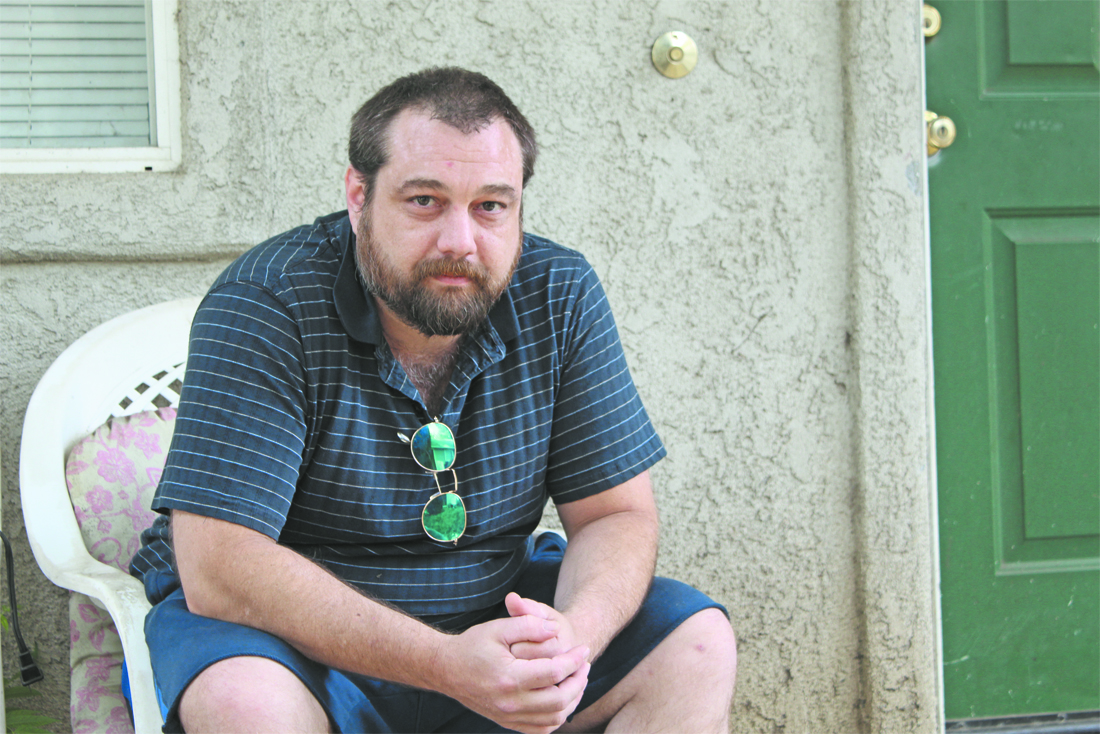
Photo by Ashiah Scharaga
Chris Singleton has to be out of his current rental by July 31. Like many other renters, he is struggling to find another place to live in Chico.
After the Camp Fire, Chris Singleton and his two roommates invited a family who’d lost their home in Paradise to live with them for several months. That family found a home in Magalia in the spring and soon may be returning the favor.
Now, Singleton is losing his home in southwest Chico, too: His landlords want to sell. He’s been there for more than three years and has to be out by July 31.
“I thought I had something lined up for a few weeks up until the start of July, but that fell through. Now I’m on the scramble,” he told the CN&R. “I do have some friends in Magalia that stayed with me after the Camp Fire, and they offered me their couch, if nothing else, but that’s a long drive [to work].”
Singleton says he doesn’t blame his landlords. They lost their home in the fire, and have since moved to another state. However, he’s yet to have luck finding any alternatives—when rentals aren’t immediately snatched up, they’re just too expensive.
This second wave of displaced residents post-Camp Fire prompted the Chico City Council to provide some temporary relief until the market stabilizes. On July 2, the panel voted unanimously to consider an emergency ordinance at its next regular meeting, on Aug. 6 (the delay will give the City Attorney’s Office time to research and craft it). If adopted, it would immediately require landlords to give renters 120 days’ notice. As of now, the state mandates 30 to 60 days, depending on the length of tenancy. It’d be in effect for six months, with the potential for renewal.
This wasn’t the first time the issue was brought up. In February, Councilwoman Ann Schwab wanted to explore relief for displaced renters, including the notice extension, as well as financial stipends and an “eviction for good cause” ordinance, which would make it tougher for landlords to kick out well-behaved tenants. Her colleagues balked—her motion died for lack of a second.
Five months later, the issue resurfaced at Vice Mayor Alex Brown’s request. She told the CN&R that, back in February, the council received hundreds of emails from professionals in the housing industry after the agenda was posted, assuring the panel that the crisis was ebbing and would end soon.
“I think, in good faith, the council decided to hold off and see if that were true,” she said.
Since then, the panel has continued to hear from those who were displaced and unable to find anything but long wait lists.
That’s why Brown brought the topic back. “Admittedly, we should have done something months ago,” she said.
This instability in the rental market has been happening since November, whether landlords have decided to sell their properties to capitalize on an inflated market or because they lost their own housing in the fire (see “Squeezed out,” Newslines, Dec. 13).
At the council’s July 2 meeting, the panel considered Schwab’s original proposal. In general, an eviction for good cause ordinance requires landlords to prove there is a “good cause” to terminate a lease, such as a tenant failing to pay rent or damaging property, or the landlord needing to make substantial repairs or move into the property. Some require landlords to provide tenants with financial assistance to relocate.
That night, several representatives from the North Valley Property Owners Association and Sierra North Valley Realtors spoke against such an ordinance, but expressed support for a temporary lease termination extension.
Brandi Laffins, president of Sierra North Valley Realtors, advocated for the temporary extension, adding that the market is stabilizing: As of July 2, there were 235 single-family homes for sale, compared with the 50 available 10 days after the fire. Last July, there were 256 on the market.
But that doesn’t mean the crisis is over. Other speakers that night shared stories of displaced friends and family members desperately seeking a place to land. Laura Moreno, a local nurse who has lived in Chico for 30 years, said she could not find anything affordable and would be evicted in 30 days.
“Something needs to be done to protect renters from this kind of thing happening,” she told the council. “I’m being faced with having to leave a town that I love, and it shouldn’t be like that.”
Ultimately, the panel did not vote on an eviction for good cause ordinance. While the proposed extension for eviction and lease termination notices would not address all of the issues with the local housing market, it would at least give renters more time to secure a new place, Brown said. The League of Women Voters will host a forum about rental relief policies later this year, which could help the council consider future actions.
“I think tenant rights are at the top of many of our minds on the dais,” Brown told the CN&R. “It’s just a matter of figuring out what the approach could be.”
Singleton said he appreciated the council’s decision that night. Had it come sooner, it would have given him more time to plan, he said. “As long as it’ll be helping somebody, it’ll be worth it,” he added.
Renters could still face a challenge when it comes to paying for hefty deposits, even with the longer time frame, he continued, so financial assistance policies—including “something as simple as [landlords] giving a security deposit back early”—could help.
